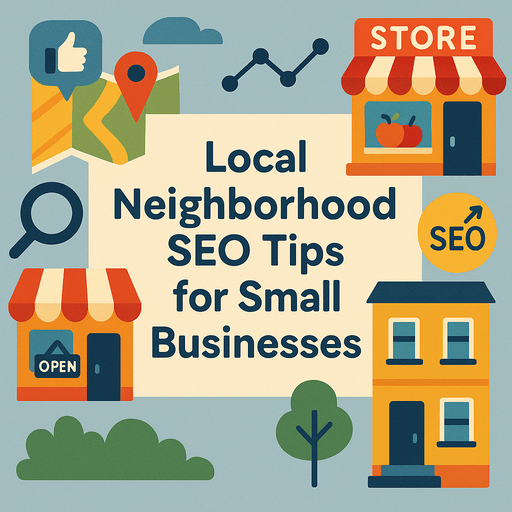Local Neighborhood SEO Tips for Small Businesses

Short Answer: Local neighborhood SEO means optimizing your website, Google Business Profile, and content for specific neighborhoods, landmarks, and micro-areas, not just your city. For small businesses, this helps you show up in “near me” searches, attract nearby customers, and stand out from bigger competitors.
Introduction
Most small businesses know the importance of local SEO, but too often the focus stays on city-level searches. The problem is that customers rarely type just “plumber in Savannah” or “coffee shop Newburgh.” Instead, they search for hyperlocal results like “coffee shop near Liberty Street” or “plumber in Bluffton’s Old Town.”
That’s where local neighborhood SEO comes in. By narrowing your strategy to specific areas, you can connect with customers who are closest to your business and most likely to convert. Here are practical local neighborhood SEO tips that work for small businesses in 2025.
What Is Local Neighborhood SEO?

Local SEO focuses on making your business visible across an entire city or region. Neighborhood SEO zooms in further, targeting micro-areas, districts, and landmarks. Instead of competing city-wide, you’re ranking where customers are most likely to search—within a few blocks of your location.
For small businesses, this hyperlocal focus levels the playing field. You don’t need to outrank a national chain across the whole city. You just need to be the most trusted option in your neighborhood.
6 Local Neighborhood SEO Tips
To put neighborhood SEO into action, here are six practical strategies that can help small businesses boost visibility and win more local customers.
1. Optimize Content With Neighborhood Keywords
Generic city-level keywords aren’t enough anymore. Customers search by neighborhood, landmark, or even zip code. Your content should reflect that intent.
For example:
- City-level: “Newburgh coffee shop.”
- Neighborhood-level: “Coffee shop near Liberty Street in Newburgh.”
These small but powerful shifts help you appear in “near me” searches, voice queries, and AI overviews. Use neighborhood keywords naturally in service descriptions, blog posts, and FAQs.
Tip: If you’re just getting started, check out my guide on DIY SEO for Small Businesses for more basics you can apply right away.
2. Create Neighborhood-Specific Pages or Sections
If you serve multiple areas, build landing pages tailored to each neighborhood. Include driving directions, parking details, maps, and photos that connect your business to the area. Add testimonials from customers who live nearby to strengthen trust signals.
This strategy gives you a better chance of ranking for searches like “best vet in Warwick Village” instead of competing for broader, highly competitive city-wide terms.
3. Enhance Google Business Profile With Neighborhood Details
Your Google Business Profile is often the first thing people see, so make it count. Add neighborhood names in your description, posts, and services. Upload photos that show recognizable local spots like parks, downtown districts, or cross-streets.
Encourage reviewers to mention neighborhoods too. A review that says, “Best HVAC company in Bluffton’s Old Town” is far more powerful than a generic five-star comment.
4. Write Hyperlocal Blog and FAQ Content
Neighborhood SEO works best when your content speaks directly to everyday local intent. A home services company could write “Best HVAC tips for Warwick Village homes.” A pet shop could post “Top pet-friendly cafes near Downing Park.”
Adding FAQs captures conversational and voice search queries such as:
- “Where’s the closest auto shop near Broadway and Liberty Street?”
- “Which cafes in Downtown Savannah are dog friendly?”
This content style boosts your chances of being featured in AI-driven answers and voice results.
5. Build Local Trust With User-Generated Content
Ask customers to share photos and reviews that reference your neighborhood. A simple snapshot of your storefront with a local landmark in the background can be more persuasive than polished stock images.
This kind of authentic, neighborhood-rich content reinforces your business as part of the community and sends trust signals to both search engines and potential customers.
6. Collaborate With Other Neighborhood Businesses
Partnering with nearby businesses is an underrated SEO move. You can co-host events, publish seasonal neighborhood guides, or run cross-promotions that highlight multiple shops. These efforts naturally lead to backlinks, brand mentions, and stronger neighborhood authority.
For example, a florist, bakery, and boutique in the same district could create a “Downtown Mother’s Day Gift Guide” that promotes all three businesses. Everyone benefits from the visibility and traffic.
FAQ
Q1: What’s the difference between local SEO and neighborhood SEO?
A1: Local SEO targets your whole city, while neighborhood SEO focuses on smaller areas like districts, zip codes, or landmarks, making your business more visible in hyperlocal searches.
Q2: How can I add neighborhood keywords without sounding forced?
A2: Use them naturally in service descriptions, blog posts, and FAQs. Example: “We offer plumbing services near Liberty Street in Newburgh” instead of keyword stuffing.
Q3: Do I need a separate page for each neighborhood I serve?
A3: Not always, but dedicated landing pages for your top neighborhoods can help you rank better for specific searches. Start with your highest-demand areas.
Q4: Does neighborhood SEO help with voice search?
A4: Yes, voice assistants often pull results based on hyperlocal intent like “near me” or “closest to [landmark],” so neighborhood SEO directly improves your chances of being found.
Make Your Neighborhood Work for You
Small businesses don’t need to compete with big brands across entire cities. By focusing on local neighborhood SEO, you can dominate micro-areas, connect with nearby customers, and win in “near me” searches where bigger competitors can’t keep up.
If you want help tailoring a neighborhood SEO strategy for your small business, reach out today. I’d love to help you get found where it matters most.

0 Comments Add a Comment?